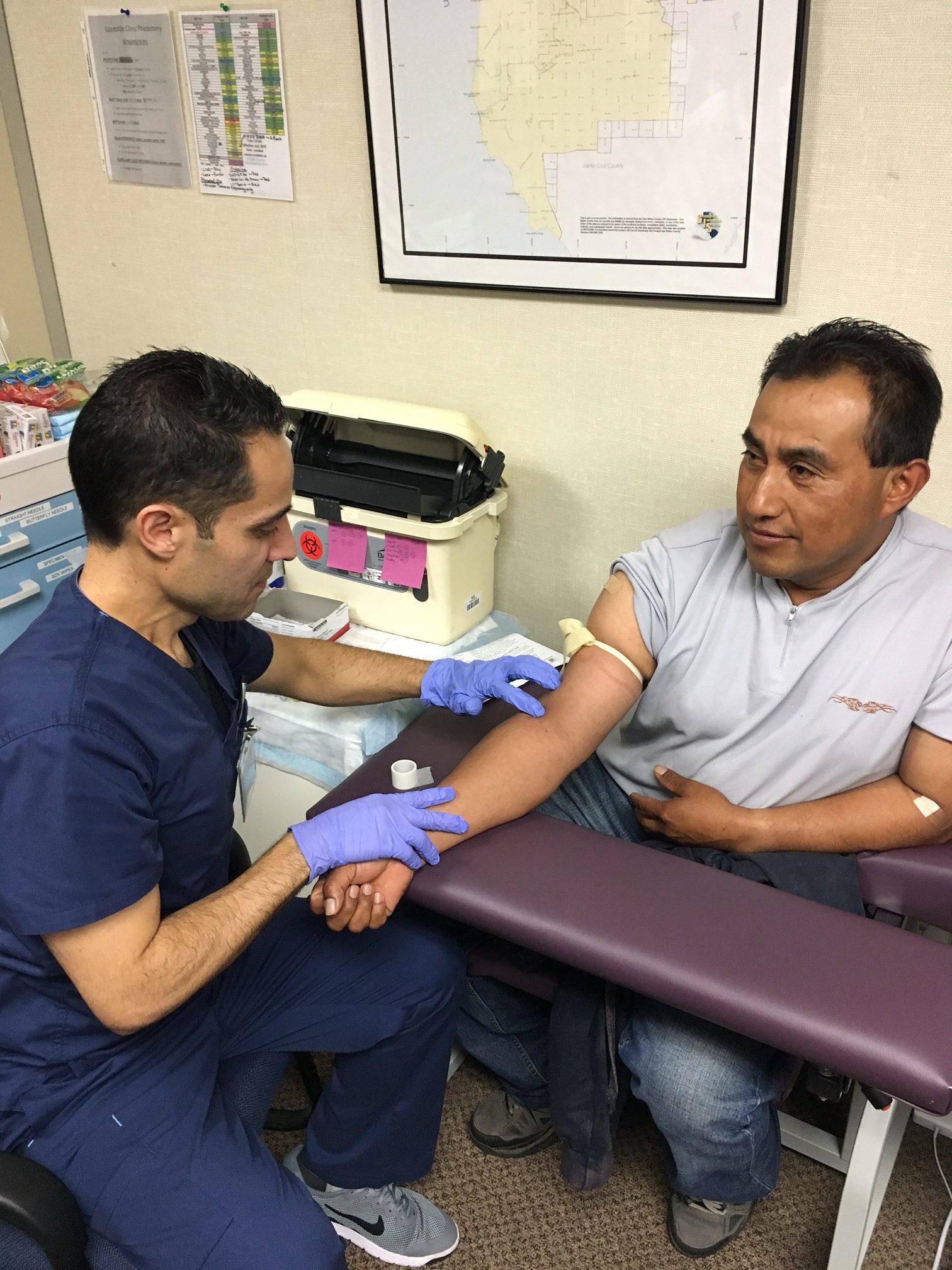
Humberto Amezcua said yes to everything the doctors suggested at Puente’s Stanford University-run medical clinic. Yes to a physical, yes to a full blood test panel, yes to flu shot. He lost access to medical coverage in June, and, although he is a legal resident, he doesn’t “even know right now how to get back on it again,” he says. “So I wanted to take advantage of the fact that there are free physicals.” He got everything he asked for at the clinic in November, including an appointment to regain his health coverage.
Patients like Amezcua are the reason Puente and Stanford wanted to collaborate on a free clinic pilot project, to use Puente’s medical clinic offices to serve the most underserved people in the South Coast community. On two Sundays so far – in October and November, and one to come in December – the clinic has been filled with white-coated physicians and skilled medical professionals from the Stanford Center for Innovation in Global Health.
“The idea is to work with patients who are uninsured explains Molly Wolfes, Puente’s Community Health Coordinator. Puente’s ongoing Thursday night clinic, a partnership with the San Mateo County’s Coastside Clinic, serves patients who have county-provided medical coverage or another form of health insurance.
The Sunday clinic has seen over 20 patients and the Thursday evening clinic, which has been running since July 2015 has seen more than 120 patients, for a total of 345 visits. Only 5-7 appointments are available every Thursday evening. But Puente is aware there are still community members who do not have health insurance despite aggressive efforts by Puente’s Promotores de Salud (community health workers) and Community Resource Navigators. Wolfes doesn’t know how many – that’s one thing the Sunday clinic may help ascertain.
“We are at the point in the Thursday clinic where we have more people wanting appointments than slots available. There is a greater need for more medical services,” says Wolfes.
Dr. Michele Barry wants to help the Sunday clinic become a permanent weekend resource in Pescadero. Dr. Barry, a professor of medicine and founder and director of the Stanford Center for Innovation in Global Health, has been leading the charge on the new pilot program.
“I think it’s an outrage that we live in the richest country in the world and that we don’t have adequate health care, even with Obamacare,” she says.
On November 6th, she joined an all-volunteer crew of residents, graduate and undergraduate students to staff the clinic. As patients arrived on a first-come, first-served basis, they sat down with bilingual interpreters from Stanford who interviewed them about their medical histories and helped funnel them into Puente economic security programs as needed – including referrals for county health coverage, mental health services and food stamps – all services available at Puente. Doctor’s assistants took their vitals. A lab manager handled their phlebotomies. One of three available physicians, either Dr. Barry or one of her residents, examined them.
During the clinic, Dr. Barry examined several patients who were overweight. “That’s indicative of a poor diet. Also, there was more diabetes than I was expecting.” These sorts of chronic conditions require regular medical attention, which is exactly what patients don’t have.
The model for the Puente pilot clinic is based on the Stanford Cardinal Free Clinics, which exist to address health disparities in underserved parts of San Mateo and Santa Clara counties. They are open to all underserved patients, regardless of immigration status.
Dr. Barry’s students are often bilingual and committed to spending their careers serving communities like Pescadero. By the time they graduate, many of them have already learned or worked in other countries, such as Ecuador.
Sarah Wachtel is a perfect example. The second-year resident grew up in Salinas, going to school with the children of farm workers. She has worked in Chile. She’s bilingual, and her dream is to use her Spanish and her medical training to serve patients in need.
“I think I can add a lot by making myself available. Well-funded clinics can function without us. But this,” she said – pointing to the Puente clinic – “literally wouldn’t work without volunteers, and it’s nice feeling that we’re a vital resource.”
If the clinic pilot project succeeds, Stanford will also be a vital resource for medical referrals that extend beyond Puente’s sphere. From ophthalmology to oncology, Stanford has a network of specialists that could change patients’ lives.
Ideally, Puente’s passionate team of Community Health Workers (Promotores de Salud) and Community Resource Navigators would eventually funnel most patients into Puente’s Thursday clinic by helping them qualify for county-provided medical care.
That would be extremely welcome to Amezcua, who relies on a dwindling cache of pills to help control his diabetes. Without a doctor, his supply will soon run out.
“I’m grateful for the fact that there are services for people who don’t have anything,” he says.
Although Puente has received significant financial support from San Mateo County Measure A funding, Kaiser, and Lucile Packard Children’s Hospital Stanford, more funding is needed to support our health initiatives. Donate to Puente today.


